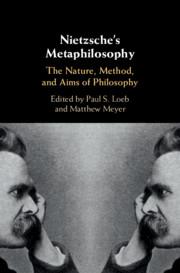Book contents
- Nietzsche’s Metaphilosophy
- Nietzsche’s Metaphilosophy
- Copyright page
- Contents
- Contributors
- Acknowledgments
- Note on Texts, Translations, and References
- Abbreviations
- Introduction
- Part I Evolving Metaphilosophies
- Chapter 1 Metaphilosophy and “Natural History”
- Chapter 2 The Dialectics of Nietzsche’s Metaphilosophies
- Chapter 3 Nietzsche as Metaphilosopher
- Part II The Nature of Philosophy
- Part III The Method of Philosophy
- Part IV The Aims of Philosophy
- Bibliography
- Index
Chapter 1 - Metaphilosophy and “Natural History”
Nietzsche’s Beyond Good and Evil on the Free Spirit
from Part I - Evolving Metaphilosophies
Published online by Cambridge University Press: 24 October 2019
- Nietzsche’s Metaphilosophy
- Nietzsche’s Metaphilosophy
- Copyright page
- Contents
- Contributors
- Acknowledgments
- Note on Texts, Translations, and References
- Abbreviations
- Introduction
- Part I Evolving Metaphilosophies
- Chapter 1 Metaphilosophy and “Natural History”
- Chapter 2 The Dialectics of Nietzsche’s Metaphilosophies
- Chapter 3 Nietzsche as Metaphilosopher
- Part II The Nature of Philosophy
- Part III The Method of Philosophy
- Part IV The Aims of Philosophy
- Bibliography
- Index
Summary
One way of dealing with the question “what is philosophy?” is to ask what a philosopher is – or should be. For Nietzsche, this is a fundamental issue. He often frames the question in genetic terms: How does one become a philosopher? Giving an answer to this question is the task of the “natural history” (Naturgeschichte) of the free spirit. It is not an impersonal question: Nietzsche himself functions as the model for the “free spirit” (or “superior man”) whose “natural history” he intends to write (§ 1). Focusing on the writing process that led to Beyond Good and Evil, the present chapter reconstructs this project and its metaphilosophical implications (§ 2), asking whether this “natural history” can be qualified as naturalistic (§ 3). In the writings of 1888, questions about Nietzsche himself and his personal role in history come to take the place of general issues concerning the philosopher and his task. The conclusion of the chapter will briefly address this shift.
Keywords
- Type
- Chapter
- Information
- Nietzsche's MetaphilosophyThe Nature, Method, and Aims of Philosophy, pp. 9 - 21Publisher: Cambridge University PressPrint publication year: 2019

